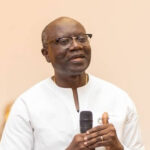The Chief Executive of the Fair Wages and Salaries Commission (FWSC), Mr Benjamin Arthur, has embarked on working visits to the Ghana Atomic Energy Commission (GAEC) and the Nuclear Regulatory Authority (NRA).
The visits aim to foster collaboration with key institutions and better understand the concerns of their workforce, particularly regarding conditions of service.
At GAEC, Mr Arthur was given an overview of the commission’s groundbreaking technological and scientific innovations, such as gamma irradiation and the Black Soldier Fly Technology, which have significant applications in agriculture and waste management.
Prof. Samuel B. Dampare, Director General of GAEC, highlighted the institution’s strides in health, agriculture, medicine, industry, and space science.
He said GAEC’s reputation as a global leader in nuclear science and technology was well-earned, attributing this to its focus on research and development, innovation and technology transfer, and human resource development.

The Director of Radiological and Medical Sciences Research Institute (RAMSRI), Associate Professor Francis Hasford, underscored GAEC’s 62-year legacy of promoting the peaceful use of nuclear and allied sciences for national development.
He noted that GAEC’s seven technical institutes and five directorates support critical sectors like food and agriculture, health and safety, and energy.
In particular, the gamma irradiation technology was showcased as a solution for extending the shelf life of perishable foods, while the Black Soldier Fly Technology was presented as a sustainable approach to waste management and a potential business opportunity for entrepreneurs in agriculture.
Nana Boateng, Director for Commercialisation and Communication at GAEC, explained that the institution is focused on protecting its intellectual property and transferring technology to the private sector in support of the government’s industrial development agenda.
Engagement with the Nuclear Regulatory Authority: Addressing Attrition and Safety
During the visit to the NRA, the Director General, Dr. Nii Kwashie Allotey, welcomed the FWSC delegation and provided an overview of the authority’s mandate. He stressed the NRA’s critical role in regulating nuclear and radioactive materials in Ghana, ensuring public safety, and preparing the country for nuclear power generation.
However, Dr. Allotey raised concerns about the authority’s high attrition rate, which he attributed to low remuneration. He revealed that the NRA’s staff strength had dwindled from 95 in 2022 to 78 currently. He warned that if this trend continues, it could severely affect the authority’s operations, given the time and cost involved in training new experts.
“It takes significant resources to train specialists in this field. Replacing them is not only costly but also time-consuming,” Dr. Allotey said, emphasising the urgent need for improved working conditions to retain skilled professionals.
The Director of the Nuclear Installations Directorate, Prof. Emmanuel Ampomah-Amoako, elaborated on the NRA’s activities, which include developing regulations, conducting inspections, and enforcing compliance with nuclear safety standards. He highlighted the broad applications of radiation in sectors such as agriculture, health, construction, telecommunications, and national security.
Commitment to Fair Wages and Better Conditions of Service
In response, Ing. Benjamin Arthur reaffirmed the FWSC’s commitment to working with stakeholders to promote fair compensation practices. He urged GAEC and NRA to redevelop their scheme of service to reflect various job grades and introduce a fairer salary structure.
“The Commission is committed to working closely with institutions like GAEC and NRA to ensure fair compensation and better working conditions for their staff,” Ing. Arthur assured.
Improving conditions of service, particularly addressing low wages and high attrition, was a key focus of both meetings. The parties agreed on the need for proactive steps to address these challenges and pledged to continue their collaboration toward achieving this goal.




